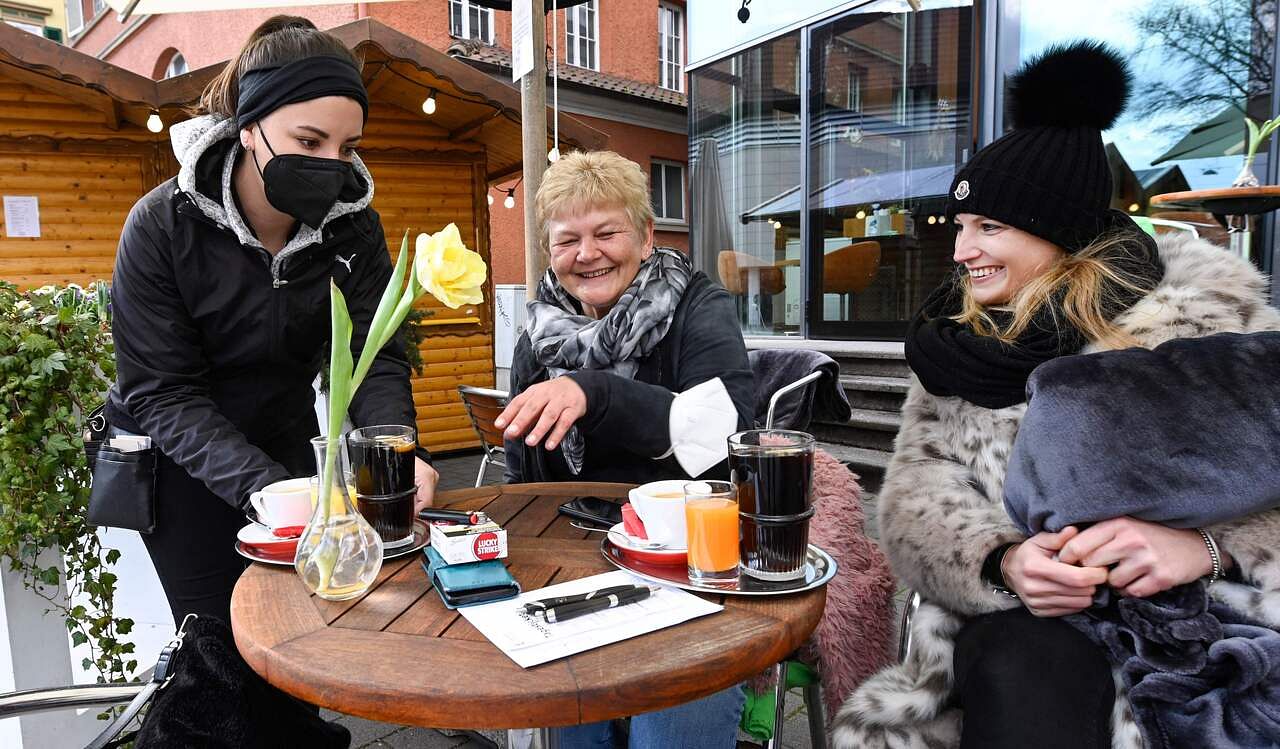TUEBINGEN, BADEN-WURTTEMBERG (BLOOMBERG) - In locked-down Germany this weekend, there's still a place where you can browse boutiques, attend a theatre performance and relax at a cafe.
Tuebingen - a university city in south-west Germany with half-timbered buildings, cobblestone lanes and a fresco-covered town hall - is sidestepping the country's curbs and offering a day pass for something akin to pre-pandemic life.
The only hurdle for admission is a negative Covid-19 test, and that's free.
The initiative, which started earlier this month and is effectively a small-scale precursor to planned vaccine passports, has struck a chord in Europe's largest economy.
Amid growing frustration with rising infections and sluggish inoculations, Germans are desperate for a return to some semblance of normality.
Others are beginning to do the same. Backed by widespread testing, the state of Saarland plans to allow restaurant visits in groups as large as 10 people, among other freedoms.
"We want to take a new path in the fight against the pandemic," Mr Tobias Hans, Saarland's premier, said in a press conference on Thursday. Not everyone was following the old rules anyway, he added.
Unlike in countries with stronger central governments, break-away strategies are possible under Germany's federal system, which puts much of the authority over pandemic policy in the hands of regional officials.
Chancellor Angela Merkel effectively called for more such efforts after apologising for a bungled plan to impose a hard nationwide lockdown over the Easter weekend.
"We don't forbid any mayor or district commissioner to act in the same way" as Tuebingen, she said in a speech to Parliament on Thursday. "Everyone can do this, and the federal state will always support it."
The aborted five-day shutdown over Easter was the latest sign of the chancellor's struggles to forge a national strategy. Politicians have increasingly focused on positioning themselves for September's elections, which will determine her successor.
That relegates Ms Merkel to little more than pleading with the public to abide by rules that may or may not be enforced locally.
Tuebingen's tests are available at multiple places in the picturesque Old Town - one of the rare German city centres that survived World War II bombings. Results are printed on an armband with a QR code - readable by smartphone - that needs to be shown to get into shops and restaurants.
"Testing needs to be like brushing your teeth," said Dr Lisa Federle, an emergency physician who helped spearhead the programme.
The project was designed for Tuebingen residents, but out-of-towners have taken notice, prompting officials to cap day-pass tourists to 3,000 people on Saturday.

The city started handing out the passes this month, when rising contagion rates in the region threatened to force the closing of shops that had only just managed to reopen after the winter lockdown.
Despite the enhanced freedoms, it's still not a free-for-all in Tuebingen.
Contact restrictions remain in place, with restaurant tables limited to five people from two households. Those who are positive after quick antigen tests are referred for a more accurate polymerase chain reaction (PCR) assessment.
The basic idea is a sound one, said Dr Kirsty Le Doare, a professor of vaccinology and immunology at St. George's University of London, whose daughter is studying in Tuebingen.
"Knowing you have it and keeping you at home is going to stop the spread," Dr Le Doare said. "It makes perfect sense."
Because it has been in place less than two weeks, the impact of the programme is not clear yet.
The municipality's case rate on Friday was at 70.8 infections per 100,000 people over the past seven days, compared with the national figure of 119.1, the highest level in more than two months.

Data from the project is being fed to researchers at the University of Tuebingen, and Dr Federle is hopeful that testing can provide opportunities for people to interact safely.
She has pushed for broad use of quick tests in businesses and schools and helped lead a project that provided 25,000 free tests for the community.
During the pandemic's first wave, she examined asymptomatic nursing home residents and was shocked to find many were positive - with some subsequently dying.
Testing is "not a cure-all, not at all", but it can identify those who might be super spreaders before they infect others, Dr Federle said in an interview. "It's at least one possibility to gain a bit of security."











